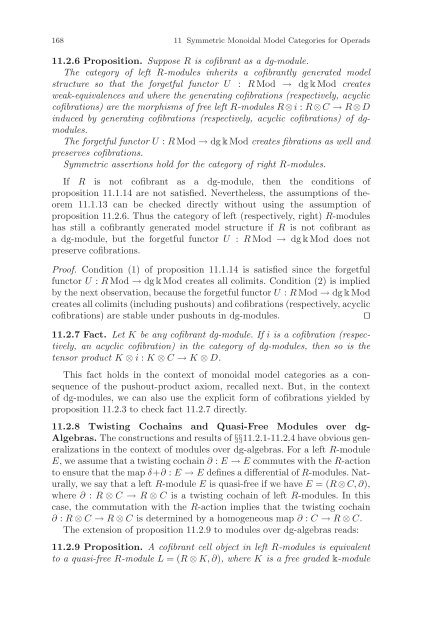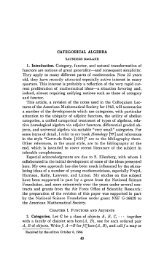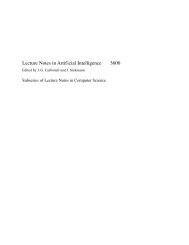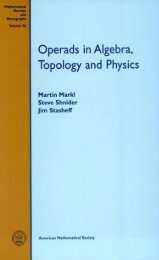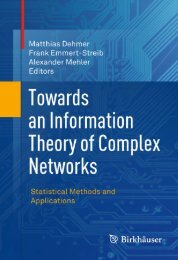Symmetric Monoidal Categories for Operads - Index of
Symmetric Monoidal Categories for Operads - Index of
Symmetric Monoidal Categories for Operads - Index of
Create successful ePaper yourself
Turn your PDF publications into a flip-book with our unique Google optimized e-Paper software.
168 11 <strong>Symmetric</strong> <strong>Monoidal</strong> Model <strong>Categories</strong> <strong>for</strong> <strong>Operads</strong><br />
11.2.6 Proposition. Suppose R is c<strong>of</strong>ibrant as a dg-module.<br />
The category <strong>of</strong> left R-modules inherits a c<strong>of</strong>ibrantly generated model<br />
structure so that the <strong>for</strong>getful functor U : R Mod → dg k Mod creates<br />
weak-equivalences and where the generating c<strong>of</strong>ibrations (respectively, acyclic<br />
c<strong>of</strong>ibrations) are the morphisms <strong>of</strong> free left R-modules R ⊗ i : R ⊗ C → R ⊗ D<br />
induced by generating c<strong>of</strong>ibrations (respectively, acyclic c<strong>of</strong>ibrations) <strong>of</strong> dgmodules.<br />
The <strong>for</strong>getful functor U : R Mod → dg k Mod creates fibrations as well and<br />
preserves c<strong>of</strong>ibrations.<br />
<strong>Symmetric</strong> assertions hold <strong>for</strong> the category <strong>of</strong> right R-modules.<br />
If R is not c<strong>of</strong>ibrant as a dg-module, then the conditions <strong>of</strong><br />
proposition 11.1.14 are not satisfied. Nevertheless, the assumptions <strong>of</strong> theorem<br />
11.1.13 can be checked directly without using the assumption <strong>of</strong><br />
proposition 11.2.6. Thus the category <strong>of</strong> left (respectively, right) R-modules<br />
has still a c<strong>of</strong>ibrantly generated model structure if R is not c<strong>of</strong>ibrant as<br />
a dg-module, but the <strong>for</strong>getful functor U : R Mod → dg k Mod does not<br />
preserve c<strong>of</strong>ibrations.<br />
Pro<strong>of</strong>. Condition (1) <strong>of</strong> proposition 11.1.14 is satisfied since the <strong>for</strong>getful<br />
functor U : R Mod → dg k Mod creates all colimits. Condition (2) is implied<br />
by the next observation, because the <strong>for</strong>getful functor U : R Mod → dg k Mod<br />
creates all colimits (including pushouts) and c<strong>of</strong>ibrations (respectively, acyclic<br />
c<strong>of</strong>ibrations) are stable under pushouts in dg-modules. ⊓⊔<br />
11.2.7 Fact. Let K be any c<strong>of</strong>ibrant dg-module. If i is a c<strong>of</strong>ibration (respectively,<br />
an acyclic c<strong>of</strong>ibration) in the category <strong>of</strong> dg-modules, then so is the<br />
tensor product K ⊗ i : K ⊗ C → K ⊗ D.<br />
This fact holds in the context <strong>of</strong> monoidal model categories as a consequence<br />
<strong>of</strong> the pushout-product axiom, recalled next. But, in the context<br />
<strong>of</strong> dg-modules, we can also use the explicit <strong>for</strong>m <strong>of</strong> c<strong>of</strong>ibrations yielded by<br />
proposition 11.2.3 to check fact 11.2.7 directly.<br />
11.2.8 Twisting Cochains and Quasi-Free Modules over dg-<br />
Algebras. The constructions and results <strong>of</strong> §§11.2.1-11.2.4 have obvious generalizations<br />
in the context <strong>of</strong> modules over dg-algebras. For a left R-module<br />
E, we assume that a twisting cochain ∂ : E → E commutes with the R-action<br />
to ensure that the map δ+∂ : E → E defines a differential <strong>of</strong> R-modules. Naturally,<br />
we say that a left R-module E is quasi-free if we have E =(R⊗C, ∂),<br />
where ∂ : R ⊗ C → R ⊗ C is a twisting cochain <strong>of</strong> left R-modules. In this<br />
case, the commutation with the R-action implies that the twisting cochain<br />
∂ : R ⊗ C → R ⊗ C is determined by a homogeneous map ∂ : C → R ⊗ C.<br />
The extension <strong>of</strong> proposition 11.2.9 to modules over dg-algebras reads:<br />
11.2.9 Proposition. A c<strong>of</strong>ibrant cell object in left R-modules is equivalent<br />
toaquasi-freeR-module L =(R ⊗ K, ∂), whereK is a free graded k-module


